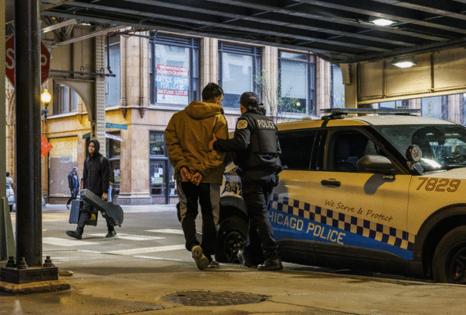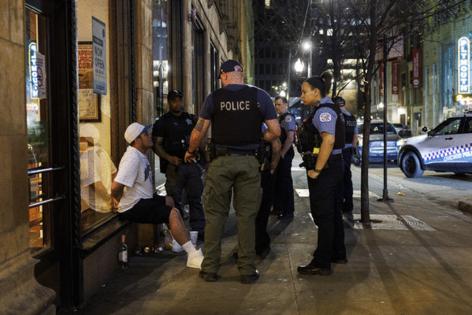Migrant arrests are up in Chicago, but they're rarely accused of violent felonies
Published in News & Features
CHICAGO -- As 40,000 asylum-seekers have arrived in Chicago in less than two years, a Tribune analysis of crime data shows the impact of migrants has been mostly felt in nonviolent offenses, particularly driving-related and thefts, and few arrests for violent felonies.
The analysis of crimes since Aug. 31, 2022, when Texas’ Republican governor, Greg Abbott, began busing asylum-seekers to Chicago, shows that as more migrants have arrived, the number of their arrests has increased. But they’re typically picked up for traffic infractions and thefts, and any misdeeds they’re committing do not appear to have fueled a crime wave.
Researchers say they’re not surprised by the Tribune’s findings. They point out that most migrants come for a better life, and they surmise that those who end up committing crimes typically steal out of desperation.
“It’s certainly not a violent crime wave,” said Graham Ousey, a criminologist at William & Mary in Virginia. “It is the impact of people who are deprived of resources.”
Still, tens of thousands of asylum-seekers have descended upon Chicago with an immediate need for shelter and services. In response, the city has rapidly turned abandoned buildings and park field houses into makeshift shelters to accommodate them — often without much notice and as a surprise to the neighborhoods they’re in.
Former President Donald Trump has cited national anecdotes of horrific crimes blamed on migrants to claim Democrats have allowed sanctuary cities to become lawless, even as the Biden administration and allies, including Mayor Brandon Johnson, counter that Republicans created the migrant crisis in cities like Chicago to scare voters and score political points.
Immigration advocates have argued it’s a new chapter in a centuries-old playbook by politicians to demonize newcomers, from the Irish to Mexicans. But a rise in any crime — even petty — near city-run shelters can frustrate residents and business owners who bear the brunt of what crowds of migrants without jobs or money can bring.
“We’re simply not enforcing quality-of-life laws around our shelters,” said Ald. Raymond Lopez, 15th, whose Southwest Side ward included a shelter for single adults in the Gage Park field house until the city closed it earlier this month. “Politically, we have an environment that is making excuses for those low-level offenses as something that should be forgiven or ignored without realizing that it has a very real snowball effect in our neighborhoods.”
Despite research showing immigrants have long been less likely to commit crime than native-born residents, Lopez still questioned whether the city’s crime data could accurately reflect the true story of migrant crime. He said residents in his ward are already disenchanted with police and rarely call to report problems, no matter who is causing them.
To be sure, the Tribune analysis has limitations beyond how often crime goes unreported. For example, Chicago police don’t track arrests of asylum-seekers, but rather arrestees’ country of birth. Even then, that’s not listed for 1 in 7 arrests.
...continued
©2024 Chicago Tribune. Visit at chicagotribune.com. Distributed by Tribune Content Agency, LLC.










Comments